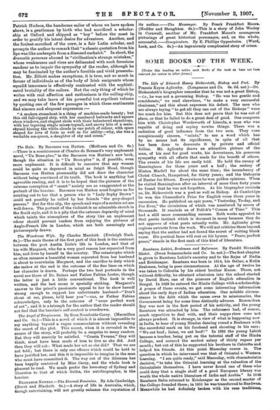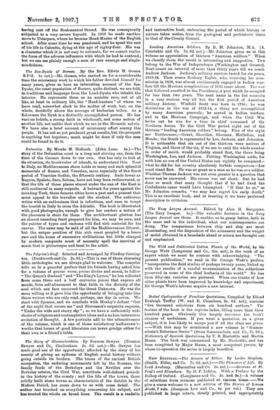Ramtanu Lahiri, Brahman and Reformer. By Pandit Sivanath Sitstri. (Swan
Sonnenschein and Co. 5s. net.)—The first chapter is given to Ramtanu Lahiri's ancestry and to the Rajas of Nadia. and Krishnag-ar. Ramtanu was born in 1814, his father, a Kuhn Brahman, being in poor circumstances. At the age of twelve he- was taken to Calcutta by his eldest brother Kasan. There, not without difficulty, he obtained admission into the school started by David Hare, one of the pioneers of English education in Bengal. In 1828 he entered the Hindu College with a scholarship. A propos of these events, we get some interesting information. about the early days of Indian education. One notable circum- stance is the debt which the cause owes to missionaries, the Government being for some time distinctly adverse. Rammohun Roy was now in the first period of his activity, and the young Ramtanu was attracted by him. The reformers had, of course, much opposition to deal with, and their suppo rters were not always prudent. It is strange, in view of what is happening now in India, to hear of young Hindus dancing round a Brahman with the sacerdotal mark on his forehead and shouting in his ears : "We eat beef ; listen, we eat beef!" In 1833 the young Lahiri became a teacher, being put on the tutorial staff of the Hindu College, and secured the modest salary of thirty rupees per month; but out of this he supported his brothers in Calcutta and helped his friends. At this point Macaulay comes in. The question in which he intervened was that of Oriental ii. Western learning. "I am quite ready," said Macaulay, with characteristic decision, "to take the Oriental learning at the valuation of the Orientalists themselves. I have never found one of them who could deny that a single shelf of a good European library was worth the whole native literature of India and Arabia." In 1818 Ramtanu Babu returned to Krishnagar as the second master of the College founded there; in 1851 he was transferred to Burdwan. Meanwhile he had definitely broken with his race traditions, having cast off the Brahmanical thread. He was consequently subjected to a very severe boycott. In 1852 he made another move to Uttarparaawhere he became Head-Masher of the English schooL After some time he was pensioned, and he spent the rest of his life in Calcutta, dying at the age of eighty-four. His was -a character which it is not easy to estimate, for we cannot realise -the force of the adverse influences with which he had to contend; but we can see plainly enough a man of rare courage and single- mindedness.































































 Previous page
Previous page